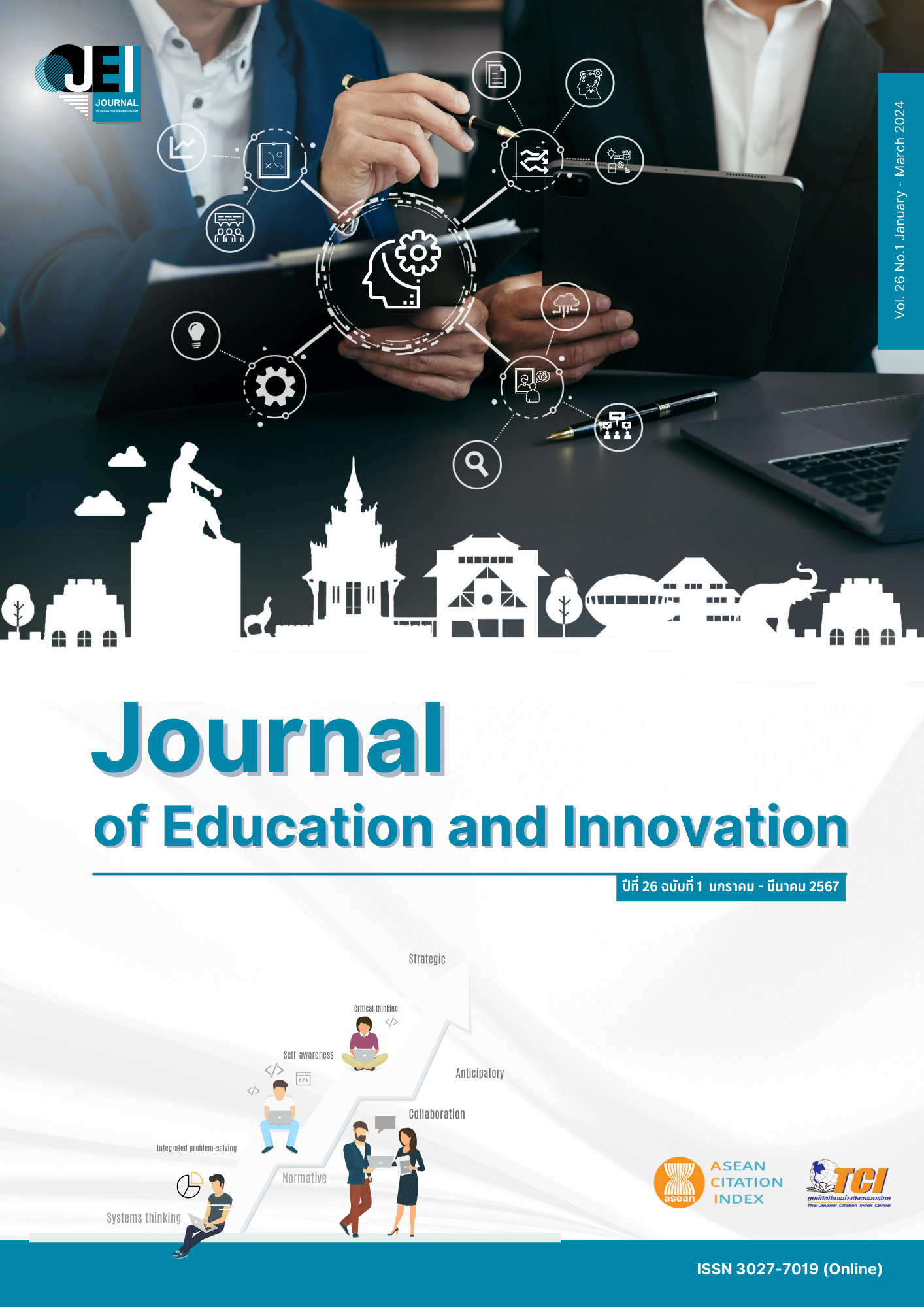THE EFFECTS OF AN EXPERIENTIAL LEARNING MANAGEMENT ON TEAMWORK ABILITIES AND LEARNING ACHIEVEMENT IN ELE 6801 SEMINAR IN ELEMENTARY EDUCATION COURSE OF GRADUATE STUDENTS TEACHERS CHIANG MAI RAJABHAT UNIVERSITY
Main Article Content
Abstract
The objectives of this research were to 1) study teamwork ability after learning management based on experiential learning with criteria, 2) compare the learning achievements after learning management in ELE 6801 Seminar in Elementary Education Course as compare with the 75 percent criterion, 3) investigate graduate students' satisfaction towards the experiential learning in ELE 6801 Seminar in Elementary Education course. This research was a quasi-experimental research conducting one group post-test design experiment and comparing with the criteria. The samples used in the study were 9 graduate students teacher studied in semester 1, who enrolled in the course of Seminar in Elementary Education, academic year 2022 obtained using the purposive sampling technique. The instruments consisted of the lesson plans by experiential learning, scoring rubrics students’ teamwork, posttest evaluation form of academic achievement and the questionnaire of students’ satisfaction. The statistical analysis were mean (), standard deviation (SD), percentage (%). The research results indicated that: 1) the graduate students’ teamwork ability after learning by experiential learning management was at the high level; 2) the learning achievement of graduate students after learning based on experiential learning was higher than the set criteria of 75%; and 3) the graduate students' satisfaction of learning based on experiential learning was at the high level. (
= 4.02, SD = 0.28).
Article Details

This work is licensed under a Creative Commons Attribution-NonCommercial-NoDerivatives 4.0 International License.
The owner of the article does not copy or violate any of its copyright. If any copyright infringement occurs or prosecution, in any case, the Editorial Board is not involved in all the rights to the owner of the article to be performed.
References
Ananpaitoon, J. (2023). The development of teamwork skill in cooking course using cooperative learning approach for grade 8 (Master thesis). Bangkok: Rangsit University.
Chiangkul. V. (2016). State of Thai Education 2014/2015 “How to reform Thai education to catch up with the world in the 21st century?”. Bangkok: Print Limited Edition.
Griffin, C. (1983). Curriculum theory in adult lifelong education. London: Croom Helm
Johns, C. (2000). Becoming a reflective practitioner. London: Blackwell Science
Johnson, D. W., & Johnson, F. D. (2003). Joining: Group theory and group skill (8th ed.). Boston: Allyn and Bacon.
Kositpipat, O. ( 2019 ).Develop the ability to work as a team with teaching model of cooperative teamwork in the course of seminar in Journalism for students of communication arts Level 2-year Faculty of Management Science. Journal of Faculty of Education Pibulsongkram Rajabhat University, 5(1), 77-86.
Kolb, D. A. (1984). Experiential learning: Experience as the source of learning and development. New Jersey: Prentice-Hall.
Kolb, A. Y., & Kolb, D. A. (2005). Learning styles and learning spaces: Enhancing experiential learning in higher education. Academy of Management Learning & Education, 4(2),193-212.
Neal, K. B., Amendola, N., Jeske, D. M., Martorana, R., Smith, E. G., Joyce, S. J., & Baudinette, S. (2018). A team-based public history assessment for undergraduates: Rationale, design and implementation in a medieval history course. International Journal of Teaching and Learning in Higher Education, 30(2), 334-349.
Office of the Education Council Secretariat (2007). Experiential and practice-based learning management. Bangkok: Agricultural Cooperatives Federation of Thailand.
Onthanee, A. (2019). The effectiveness of participatory learning to promote occupational competency for secondary school students. Journal of Education Naresuan University, 23(2), 336-350.
Panich, W. (2012). A way of building learning for students in the 21st century. Bangkok: Sodsri Foundation Saritwong.
Phinla, P., & Phinla, P. (2022). Effects of learning management based on Buddhist ways of Life in the course of truth of life for teachers for teamwork skills development for undergraduate students. Journal of Education, Prince of Songkla University, Pattani Campus, 33(1), 184-196.
Robbins, S. P., & Coulter, M.K. (2005). Management. California: Pearson Prentice Hall.
Samsung, R., Piansawan, B., & Panawong, C. (2018). The learning activities based on experiential learning to encourage learning achievement and mathematics problem solving ability on ratio and percentages for Matayomsuksa 1 student. Journal of Social Academic, 10(2), 187-202.
Srisa-ard, B,. (2018). Basic research (10th ed.). Bangkok: Suviriyasarn.
Treerattananukool,S.(2019).Development of experienced learning activities for promoting intelligences mindset in vocational students. Master of Science program. Burapha University.
Thipkong, S. (2002). Curriculum and teaching of mathematics. Bangkok: Develop Academic Quality.
Wangsittidet, S. Rattanakiat, P., Supakesorn, B., & Srikula, W. (2016). Development of experiential learning management for promoting learning skill to students in early childhood education. Maha Sarakham: Faculty of Education, Rajabhat Maha Sarakham University.
Wang-qin Shen, Hong-lin Chen, & Yan Hu. (2014). The validity and reliability of the Self directed learning instrument (SDLI) in mainland Chinese nursing students. Retrieved from http://www.biomedcentral
Yanakorn, W. (2021). Development of teamwork skills for army non-commissioned officer student: engineer corps use case study and jigsaw technique (Master thesis). Bangkok: Silpakorn University.


